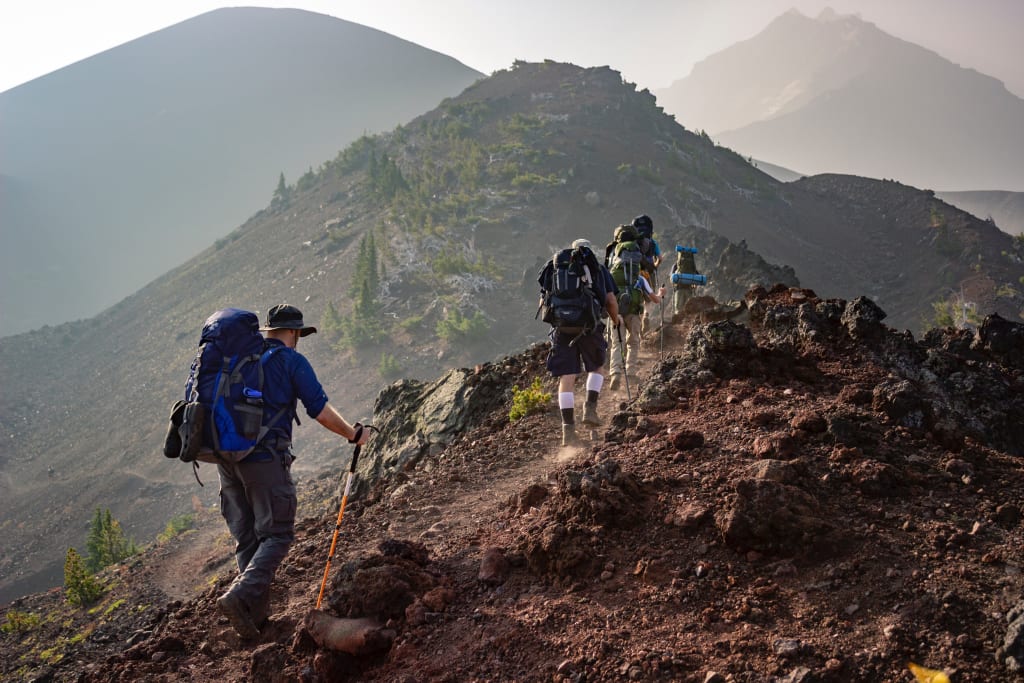Doctors Explain How Hiking Affects Our Brains
Hiking for mental health

"Nature's tranquility will seep into you like sunlight through trees." "Cares will fall off like autumn leaves when the winds blow their own freshness into you, and the storms their vitality," wrote John Muir in Our National Parks. John Muir clearly recognized the fundamental importance of spending time in nature.
Many of us, like Muir, realize the benefits of trekking in nature for the body, mind, and soul. Walking through the woods while viewing colorful birds and flora, inhaling the scent of spruce and pine trees, and listening to a quiet running stream simply relaxes and rejuvenates us. Doctors agree, which is fortunate for us. Spending time hiking in nature has been shown to have numerous mental health advantages in numerous studies.
Rumination is reduced by hiking in the woods.
Anxiety, sadness, and other issues, such as binge eating or post-traumatic stress disorder, can occur in people who ruminate or dwell too much on negative thoughts about themselves. Researchers have looked into how spending time in nature impacts rumination, and they discovered that hiking in nature reduces obsessive, negative thoughts.
Researchers evaluated the reported rumination of hikers who trekked through an urban and a natural environment in this study. They discovered that those who walked for 90 minutes in a natural setting, such as a grassland near Stanford University, experienced less rumination and had decreased brain activity in the subgenual prefrontal cortex, which is linked to mental illness. These advantages were not available to those who walked through a city.
According to these researchers, our world is becoming increasingly urbanized, and urbanization is linked to depression and other mental illnesses. Simply getting out of the city and spending time outside, where there are fewer mental stressors, less noise, and fewer distractions, can be beneficial to our mental health.
Hiking while unplugged from technology boosts problem-solving creativity.
Disconnecting from technology and reconnecting with nature can help you solve problems more creatively. Participants in this study trekked for four days while hiking in the woods and were not allowed to use technology. They were given activities that required them to be creative and solve challenging problems. They discovered that those who participated in the hiking expeditions performed 50 percent better on problem-solving tasks.
According to studies, technology and the noise of cities continually demand our attention and prevent us from focusing, putting a strain on our cognitive functioning. As a result, when we're feeling overwhelmed by the stresses of city life and being connected 24 hours a day, nature hikes can be powerful medicine. They help us think more creatively by reducing mental weariness and soothing our minds.
Hiking in the outdoors can help children with ADHD.
Survival kit for hiking
ADHD (Attention Deficit Hyperactivity Disorder) is a prevalent childhood disorder. People with ADHD have a hard time keeping focused, are often distracted, are hyperactive, and have trouble managing their impulses.
It can be difficult for parents to raise children with ADHD. Despite this, fantastic news has come from the medical and scientific communities. Researchers discovered that exposing children with ADHD to "green outdoor activities" improved their ADHD symptoms in a study led by Frances E. Kuo, PhD and Andrea Faber Taylor, PhD. As a result, according to this research, the benefits of exposure to nature can be extended to anyone suffering from inattention or impulsivity.
Simple adjustments including green activities or locations, according to doctors, can increase concentration. Increased exposure to a green view from a window seat, an afternoon nature excursion, or simply playing ball in the park can all help to alleviate undesired ADHD symptoms.
Hiking in the woods is a great way to get some exercise and boost your brainpower.
We've all heard the phrase "healthy mind, healthy body." Hiking outdoors is a great way to get some exercise and can burn anywhere from 400 to 700 calories each hour, depending on how challenging the trek is. Hiking is also less strenuous on our joints than other forms of exercise, such as running. Hiking is also a fantastic alternative for people looking to incorporate exercise into their everyday lives because it has been proved that those who exercise outside are more likely to stick to their exercise routines.
The mind and body are inextricably linked. Exercise aids in the nourishment and health of our brain cells. Aerobic exercise, in fact, may increase memory and cognitive abilities, according to University of British Columbia experts. Aerobic exercise enhanced hippocampus volume in older women, according to the study. The hippocampus is a brain region involved in spatial and episodic memory.
Exercise helps lower stress and anxiety, raise self-esteem, and produce endorphins, in addition to improving cognitive function and possibly preventing cognitive decline, as revealed in the study (feel-good hormones). It's incredible that such a basic and low-cost physical activity as hiking can bring so many mental health advantages.
Hiking is Now Prescribed by Doctors
Have you ever been ordered to "take a trip" by your doctor? This isn't a sentence we like to hear, especially from our doctors, but they do have our best interests at heart. People who spend time in nature have less stress and have better physical health, according to progressive doctors.
According to WebMD, an increasing number of doctors are prescribing "nature prescriptions" or advocating "ecotherapy" to help patients cope with worry, stress, and sadness. Furthermore, as more research demonstrates the benefits of exercising and spending time in nature, traditional health care doctors are becoming more accepting of nature prescriptions.
California has a long history of being one of the more progressive states when it comes to alternative health. The Institute at the Golden Gate, for example, has been in the forefront of promoting ecotherapy with its "Healthy Parks Healthy People (HPHP)" campaign. Community organizations collaborate with health professionals to improve the health of their parks and promote the use of parks as a pathway to better health for those who use them.
What Is the Best Way to Begin Hiking?
Hiking, fortunately, is one of the simplest and least expensive sports to participate in, and it's enjoyable and useful for the entire family. Don't attempt a Colorado 14er or trek the Appalachian Trail if you're just getting started. You can begin with simple steps. Examine nearby short hiking paths and gradually increase your distance to a safe and comfortable level. Trail maps may be found online, and smartphone apps can help you identify the ideal routes for your skill level and interests.
Make sure you're wearing appropriate hiking shoes for the terrain. Consider utilizing trekking poles, which will relieve stress on your knees while also increasing your pace and increasing your stability. To stay warm and reduce sweat, layer clothing as needed for the weather and use breathable, moisture-wicking fabrics like silk, polypropylene, wool, and fleece. Protect yourself from the sun by wearing sunscreen, sunglasses, and a hat. Keep hydrated and have a good time!
A Simple And Fun Workout To Get Fit
If you want to get in shape but find going to the gym too difficult, try these resistance band workouts!
Get your FREE Resistance Workout Plan and start working out at home in no time. You can substitute a robe tie or a bungee cord for a resistance band if you don't have one.
About the Creator
Cyber clinic
I take delight in offering medical professionals, pharmaceutical businesses, and lay audiences with meticulously researched, evidence-based, high-quality.






Comments
There are no comments for this story
Be the first to respond and start the conversation.